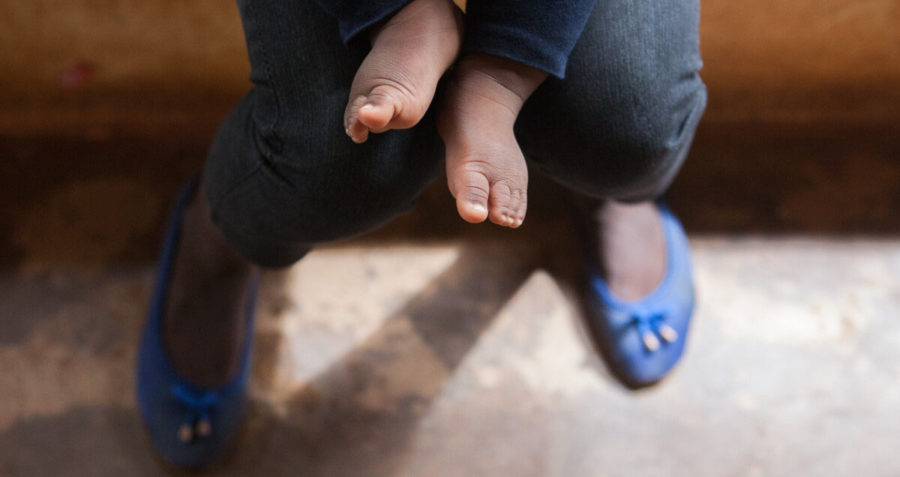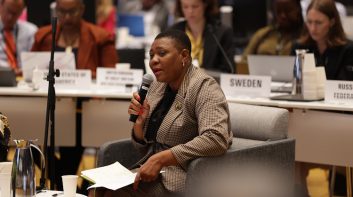Sisters are doing it for themselves in Zimbabwe
 © Frontline AIDS/Gemma Taylor 2017
© Frontline AIDS/Gemma Taylor 2017
Gladys is a young single mother living with HIV who, through her role as a mentor with the READY to Lead programme, is taking control of her own narrative. Here she talks frankly about gender inequity, how cultural norms can lead to self-stigma, and what drives her forward.
What really made me want to become a mentor was that at first I had no one to share my story with. I couldn’t tell my friends, I couldn’t even talk to my mother. When I actually got diagnosed with HIV when I went for my antenatal, I felt like that was the end of the world, like the world had shut down on me.
I wanted a group of people that I could talk to about my issues, where we could share and relate our own experiences and I also wanted to stand up, I had had enough! Coming from a traditional background and societal values where we are taught to be submissive, I have learnt that at times we are looked down upon as a woman.
I wanted somewhere where I could feel like if I hear another story it could actually change my own story, and change my life for the better.
On being labelled
In Zimbabwe, our cultural norms look down on single women as we are usually associated with sex work and you can’t always disclose your [HIV] status because you have already been labelled. You start thinking I’m not worthy, let me live on my own.
You might meet a new partner and want to disclose but there’s a fear of being labelled or being judged, so at the end of the day you keep quiet.
Stigma comes from the community – because of its values, its norms, I end up feeling like I have to live in isolation. They think if you are ‘infected’, you’re just as good as dead. They don’t give value to a person who is HIV positive.
If I look for greener pastures, in some countries like Dubai if I’m HIV positive I can’t get a visa to go and work there. So it leads to self-stigma, you start saying I can’t do this, this is not for me, this is for this person who is HIV negative. So you can see how we self- stigmatise, because we see ourselves as if we are nothing.
On supporting one another
I get to hear stories from different types of mentors [other young women living with HIV who are also enrolled in the READY to Lead programme] and try to comfort them and relate my own issues to them. We have WhatsApp groups so we usually talk about what we’re facing. For instance, so and so has faced domestic violence from her ex-boyfriend so we had to discuss this on the social platform where we could try and help. It actually got worse to such an extent that we needed to find a place where she could be safe.
We usually have our own sessions on mental health where we meet as a group and discuss about issues like where to go for counselling and how did I accept my status. You can see some of the girls are still in denial, and some of them are still dealing with the issues. It’s like we are digging deeper in our own coffers.
We have to offer psychosocial support. It’s not just about other peers, or about young women on the Ready+ programme. There are other young people living with HIV and we also want to reach out to them so we go into schools to talk.
On holding to account
We need to hold the government accountable for everything that they do. They create an environment where the community enables that self-stigma. For instance, the policies are not in support of people living with HIV. When they are doing the health policy, it feels like they are doing this out of pity, but we are paying taxes for that so it is our right as well.
Let’s look at a vital issue in Zimbabwe right now, for example stock-outs of HIV medication. They should look into it and channel money towards that. They should involve us as young people living with HIV.
I think dealing with young women on their own is incomplete, we also want to involve male counterparts [in the Ready to Lead programme]. Some of those issues we were talking about like gender-based violence, yes I might speak to so and so and empower her, but what about the boy? He’s the one who’s going to go and beat her up, so at the end of the day I think we need to involve male counterparts as mentees.
In our sessions, we can teach and encourage them. We can change some of these social norms and values. If we can keep on involving them, we’ll definitely go a long way.
On what next
My daughter inspires me a lot. When I look at her, it’s like she gives me hope to keep on, she gives me a reason to live again. She has a funny way of making me feel so good about myself.
Who do I want to be? I want to be a motivational speaker where I could relate my own story to others living with HIV on bigger platforms, internationally, where I can empower other young women to live their own lives. I would want to encourage them, I would want to provide support to them to make the decisions and choices that are right for them.
About our programme
Gladys has been supported by READY to Lead which is part of the READY portfolio of programmes designed to build Resilient and Empowered Adolescents and Young people (READY). READY to Lead is strengthening the leadership and advocacy skills of 100 young women and adolescent girls in Zimbabwe who in turn become mentors and role models to other young women.
Further Reading
Tags
Gender equalityGender-based violenceMental healthPeer supportPsychosocial support




